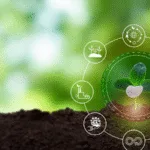Change plastic waste into valuable resources
Plastics are the materials of our era. They help us overcome global challenges, such as aligning economy and society with climate neutrality, developing new mobility concepts, or making our cities more inhabitable. However, in order to achieve a truly sustainable future and protect our environment in the long run, our understanding of plastic waste – and waste as a whole – must fundamentally change.
Covestro aims to design plastics and their components from the outset so that they can be recycled as easily as possible. Over the next few years, the company will be conducting extensive research into different recycling technologies, using its experience in chemicals and innovative capabilities. Across more than 20 research and development projects, Covestro will be developing new, efficient technologies and methods to recycle plastic. The approach is broad enough to incorporate the diversity of products and markets. The goal: providing market-ready solutions as quickly as possible.
One way to get there is chemical recycling where plastics are reduced to their original molecular form so that they can eventually be processed into entirely new materials. There is significant demand for more development in this field. The Europe-wide research project PUReSmart, for example, aims to significantly improve the recycling of polyurethane (PU) foam and establish a completely circular product lifecycle for this material. As part of this project, Covestro focuses on the chemical recycling of PU to regain high-quality raw material for new PU applications. PUReSmat will run for four years and is funded by the EU’s “Horizon 2020” programme that supports research and innovation.
Covestro PUReSmart Project
Chemical recycling is particularly helpful for plastic waste, which would otherwise be incinerated or sent to landfill. Of course, chemical recycling must be competitive in economic as well as ecological terms, compared to non-recycled products and products based on fossil raw materials. The external energy required should also come from renewable sources. Ultimately, chemical recycling is a major lever to realise Covestro’s vision to become fully circular.
Closing the loop for polyurethane mattresses
Covestro has developed an innovative process for the chemical recycling of polyurethane (PU) flexible foam, used in mattresses. On average, mattresses contain 15 – 20kgs of foam, which results in a large amount of waste at the end of their useful life. This new recycling process is novel compared to other forms of chemical recycling, as it enables the recovery of both main PU components used in mattress production. Covestro has recently started operating a pilot plant for flexible foam recycling at its Leverkusen site in Germany. The first phase is to focus on recycling one of the raw materials, before the recovery of the second component. The goal is to industrialize chemical recycling processes for used flexible foams, ultimately being able to remarket both recovered raw materials.












